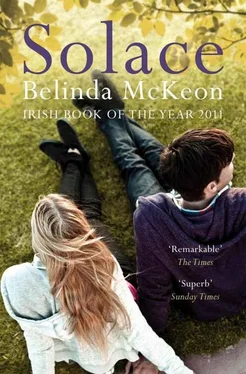But as he grew up, she said, her son grew fond of the old mews at the back of the house, which had never been renovated, which was still, for all purposes, a stable; downstairs, it still looked ready for a horse and carriage, and upstairs, it was just a couple of shabby rooms with a fireplace that smoked badly. Rupert did not care about the fireplace, or the damp on the walls. Rupert liked to invite his schoolfriends there, to have them gather in the narrow rooms to listen to records, or to play card games, or to do whatever it was that boys of his age liked to do. And Elizabeth — that was the woman’s name, Elizabeth Lefroy — had liked to stand at her own sitting-room window and look down on the mews, and to think of the life happening within its walls, of her son and his little circle. Slowly but surely, then, her son had begun to move all of his things into the mews, to decorate the walls with photographs torn from magazines, to add his own books to the squat pine shelves. And the summer after he had finished school — the months before he started at Trinity — he had begun to sleep in there every night. Elizabeth had worried about him — that he was not warm enough, that he would wake up hungry in the night and have no fridge to go to — but her son had told her not to worry, that he could take care of himself. And then, while he was at college, he had started, on Sunday afternoons, to do this ‘darling thing’, she said, of inviting her over for lunch, even though there was no kitchen to speak of in the place; he had ordered in, and together they had enjoyed all sorts of dishes at the rickety little table, and all kinds of wines, and they had talked, and her son had told her about his plans for his career, and asked her to tell him things he could not know or remember about his father, and about Kenya, and about all the people she and his father had known there. She had told him these things, and he had listened to her and, she felt, they had grown closer still, and that was a joy, she said, ‘a marvellous joy’. And on Sunday evenings, when she had crossed the yard to the main house — to her own house, as she had thought of it by then — she had begun to feel, somehow, as though she were the one living in the chilly little rooms, as though she were the one who was, as she put it, no longer quite at home.
The rattle of the doorknob startled Joanne. As she turned to greet Mona, the other trainee, she felt herself flush, guilty at her absorption in Elizabeth Lefroy’s testimony, at the fullness with which she had been living through these moments of the old woman’s life.
‘Morning,’ she said, too brightly.
‘You’re in early,’ Mona said, as Joanne had known she would. She looked perfectly put-together, as always; today a dark linen suit — a new one, Joanne thought — carefully pressed, the skirt hitting just below the knee, and black patent heels, and her makeup as flawless as though she had come from a stool in the Brown Thomas cosmetics hall.
‘Catching up,’ Joanne said. ‘I didn’t get much done over the weekend.’
Mona smiled knowingly as she laid her huge leather handbag on her desk. ‘Must have been a good one, so,’ she said.
Joanne shrugged. ‘It was fine.’
‘Yeah, right,’ Mona said. ‘You’re blushing. You’re scarlet . Something went down.’ She smirked.
It would have been easy to take it from there; to talk about meeting him, about the party, about him turning up at her door last night, about how he had come in and kissed her for ten minutes and then fallen asleep on the couch, about how she had covered him with a blanket and left him there for the night, about how bashful and sweet he’d been earlier, as she was leaving for work. He’d made her promise that she’d answer her phone when he called her later that week; he’d asked for her number, then, and discovered that he’d lost his own phone. And so he’d written her number, too, on the hand with the blurred ink.
But coke rooms and hangovers and hands through letterboxes and lost phones were not, she suspected, Mona’s idea of a fine romance, and Mona would be horrified, and probably a little disgusted, by the idea of leaving a stranger on your couch and trusting him not to steal anything — let alone by the idea of letting that stranger sleep on your couch while you yourself were asleep just a staircase away. Mona was not that kind of girl. She still lived with her parents in Castleknock. The only powder that went near her nose came out of a compact marked Chanel. She expected her boyfriends to be in control and in possession of a number of things, including their own apartments, in which they did not, ever, pass out on their own expensive couches. The parties she went to were catered. The gardens she sat in were not attached to the back walls of Thomas Street pubs.
‘So how was your weekend?’ Joanne asked, because it seemed polite.
‘Oh, you know,’ Mona said, and launched into an account of how swamped the Dundrum centre had been on Saturday, and how it always seemed impossible to get her size in anything in Harvey Nichols, and how some new restaurant on Dawson Street had sushi to die for, and how she thought maybe that she was getting tired of the nightclub she and her friends always went to on Saturday night, but how there was nowhere else worth going to, really, so what could you do?
‘Right,’ said Joanne, summoning all her reserves of empathy. ‘I suppose those places get tired fairly quickly, don’t they?’
‘They really do,’ Mona said, spinning around in her chair and seeming about to extend the analysis, but then she took a long look at the open folder on Joanne’s desk. She frowned. ‘That’s the transcript from the Lefroy case?’
Joanne nodded.
‘Crazy old bat,’ Mona said.
‘She’s definitely eccentric,’ Joanne said, and Mona arched an eyebrow.
‘I couldn’t believe the stuff she was coming out with in the witness box. She sounded like she was high on something. You know?’
‘Mmm,’ Joanne said. She looked at the last sentence she had underlined in the transcript. No longer quite at home . She thought of Elizabeth Lefroy crossing the yard at dusk on Sunday evenings, standing in the window of her silent home, looking out at the smoke-clogged outhouse her son had made his own. She imagined her in the witness box, deep lines on her face, a necklace of dark stones — jet, she thought — at her throat, a soft cardigan hanging on her thin frame. She tried to imagine her voice. She kept hearing one that, embarrassingly, was probably the Queen of England’s. She tried to be more imaginative than that, but the Queen or some woman from Poirot was the best she could do.
‘Eoin says she drinks a lot,’ Mona went on, sorting through the pages on her own desk now, putting a stack into her drawer. ‘And then there’s her age. Her age makes it easy for us, really.’ She slammed the drawer shut, pulled her chair up tight to her desk, and turned her computer on with one gleamingly manicured finger. The previous week, Joanne had seen Imelda look at Mona’s nails, then glance at her own, and then — all in the time it took her to take a document from the folder she was carrying and hand it to Mona — peer over the room to where Joanne’s unpainted nails, with their calcium spots and tattered cuticles, were hammering away on her keyboard. Imelda had given her usual curt nod then, evidently satisfied that her grooming was not the worst in the office, and their morning briefing had begun.
‘You know she’s over eighty?’ Mona said, over her shoulder, while her computer screen drifted through the slow, whirring slideshow of its start-up. ‘I mean, her testimony’s clearly unreliable. At that age, who isn’t delirious? Anyway, it’s poor Rupert I feel sorry for.’
Читать дальше












